What are the best alternatives to WhatsApp? 7 apps like WhatApp
If you’re looking for a WhatsApp alternative, you’ve probably already noticed the large number of messaging apps out there — including Telegram, Spike, Threema, Signal, Ginlo and Wire, for example. Unlike WhatsApp, most of these alternatives are open source and free of ads.
- 2 GB+ storage
- Sync across all your devices
- Spam filter and ad-free
Overview of WhatsApp alternatives
The following information was last updated in November 2023.
| Available for | Encryption | Number of users | Cost | |
|---|---|---|---|---|
| Signal | iOS, Android, macOS, Windows, Linux | End-to-end | Over 100 million | Free |
| Telegram | iOS, Android, macOS, Windows, Linux | Client-to-server and end-to-end (in secret chats) | Over 700 million | Free |
| Threema | iOS, Android, macOS, Windows, Linux | End-to-end | Over 11 million | $3.50 |
| Viber | iOS, Android, macOS, Windows, Linux | End-to-end | More than 800 million | Free |
| Spike | iOS, Android, macOS, Windows | AES-256 | At least 100,000 teams | Free |
| Ginlo | iOS, Android, for business customers also macOS, Windows and Linux | End-to-end | Unknown | Free (for private users) |
| Wire | iOS, Android, macOS, Windows, Linux | End-to-end | Unknown | Free |
Signal

Signal is, like most alternatives to WhatsApp, relatively unknown, and its developers even more so. The creators of Signal, Open Whisper Systems, have delivered end-to-end encryption software with open-source code, which has been used by WhatsApp, Telegram and other companies to develop their own encryption. Edward Snowden uses Signal, and the team around cryptographer Moxie Marlinspike, the founder of Open Whisper Systems, has built up an excellent reputation among IT security experts. Open Whisper Systems is financed entirely by scholarship grants and donations, so it doesn’t rely on any advertising.
As might be expected from the most famous encryption technology available for messengers, security is at the forefront of everything Signal does. Both private and group chats are secured with end-to-end encryption, and telephone numbers are transmitted anonymously (hashed) to the server. In contrast, users are required to share their contact list with Signal when they sign up. Signal hardly stores any metadata and doesn’t store any information about who communicates with whom. The only thing the app can store is whether someone uses the service.s the service.
| Advantages | Disadvantages |
|---|---|
| Open source | Phone number is required for registration |
| Self-destructing and disappearing messages | |
| PIN lock function | |
| Both encrypted messages and phone calls | |
| Hardly stores any metadata |
Telegram
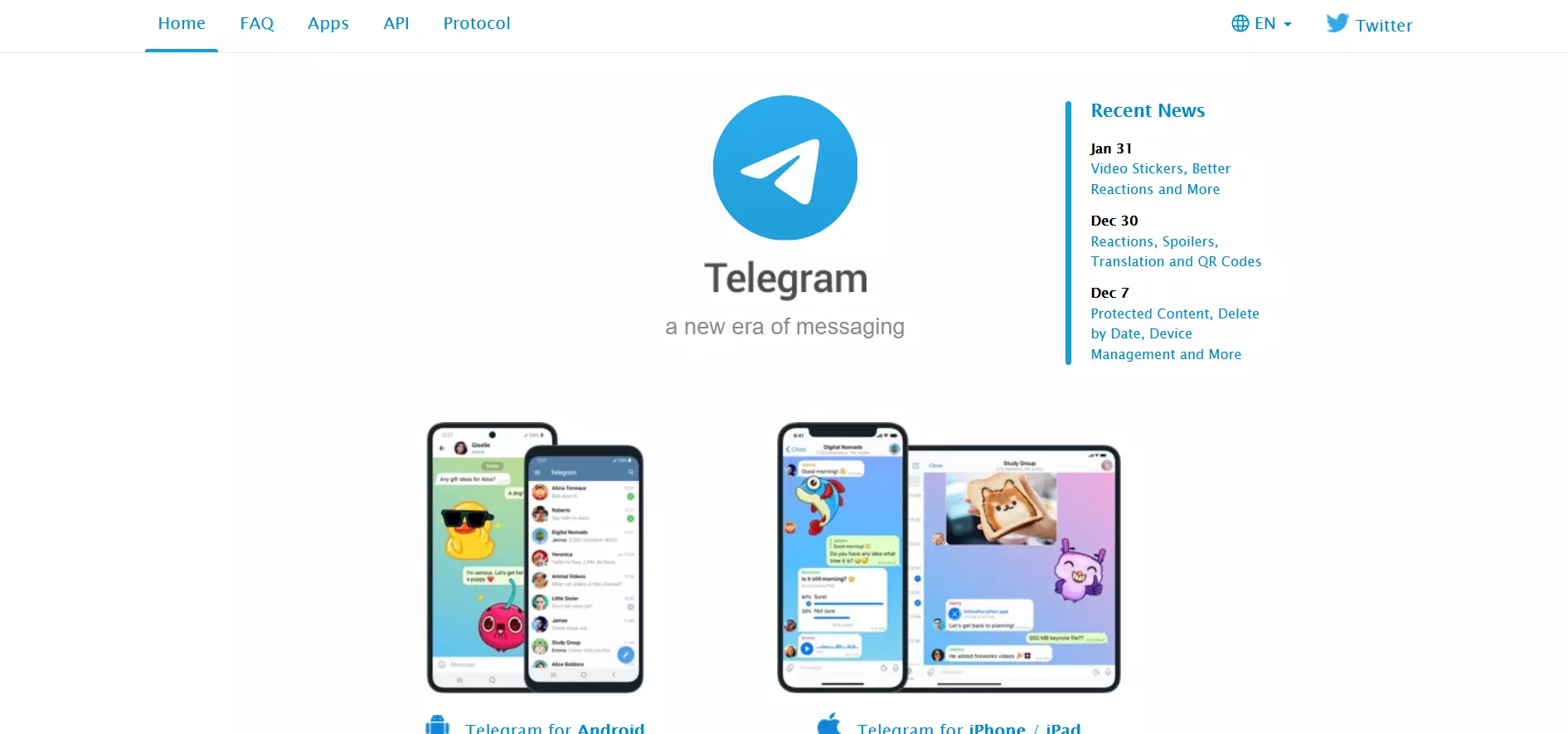
Telegram is a company run by the Russian brothers Pavel and Nikolai Durov, who are famous for founding the Russian alternative to Facebook, VKontakte. Their WhatsApp alternative has been developed even further and now the service is cloud-based, meaning that Telegram users can access their messages and content on a variety of mobile devices as well as on their computer. A further advantage is the limitless, large-scale file sharing. WhatsApp, on the other hand, puts limits on the amount of data users can use and the size of files that are received and sent. The restrictions are based on the capacity of your device, which, more often than not, is a smartphone.
Telegram is considered a very secure application. The developers offer two different forms of encryption for users. For private and group chats, there’s server-client encryption, which encrypts messages as they are transmitted from sender to server and from server to recipient. Telegram offers end-to-end encryption in the form of secret chats, which ensures that only the sender and the recipient can read a message. There’s also a setting for the secret chat mode that ensures the message will automatically be deleted after a certain amount of time. Additionally, the message and/or content sent can’t be copied from the chat or forwarded to anyone else, and if the sender chooses to delete it, it will also be deleted from the recipient’s device.
It’s important to mention that the latest version of WhatsApp now also offers end-to-end encryption for all messages. Since this type of encryption isn’t possible for cloud-based content, Telegram makes a compromise here regarding data protection in favor of greater user-friendliness. Users who do not like this and the non-transparent corporate structure of the messenger app would be better off looking for another alternative to WhatsApp.
| Advantages | Disadvantages |
|---|---|
| Unlimited amounts of files can be sent | Little transparency about the company itself |
| Open source | Stores metadata |
| Cloud-based, access from different end devices | |
| Self-destructing messages |
Threema
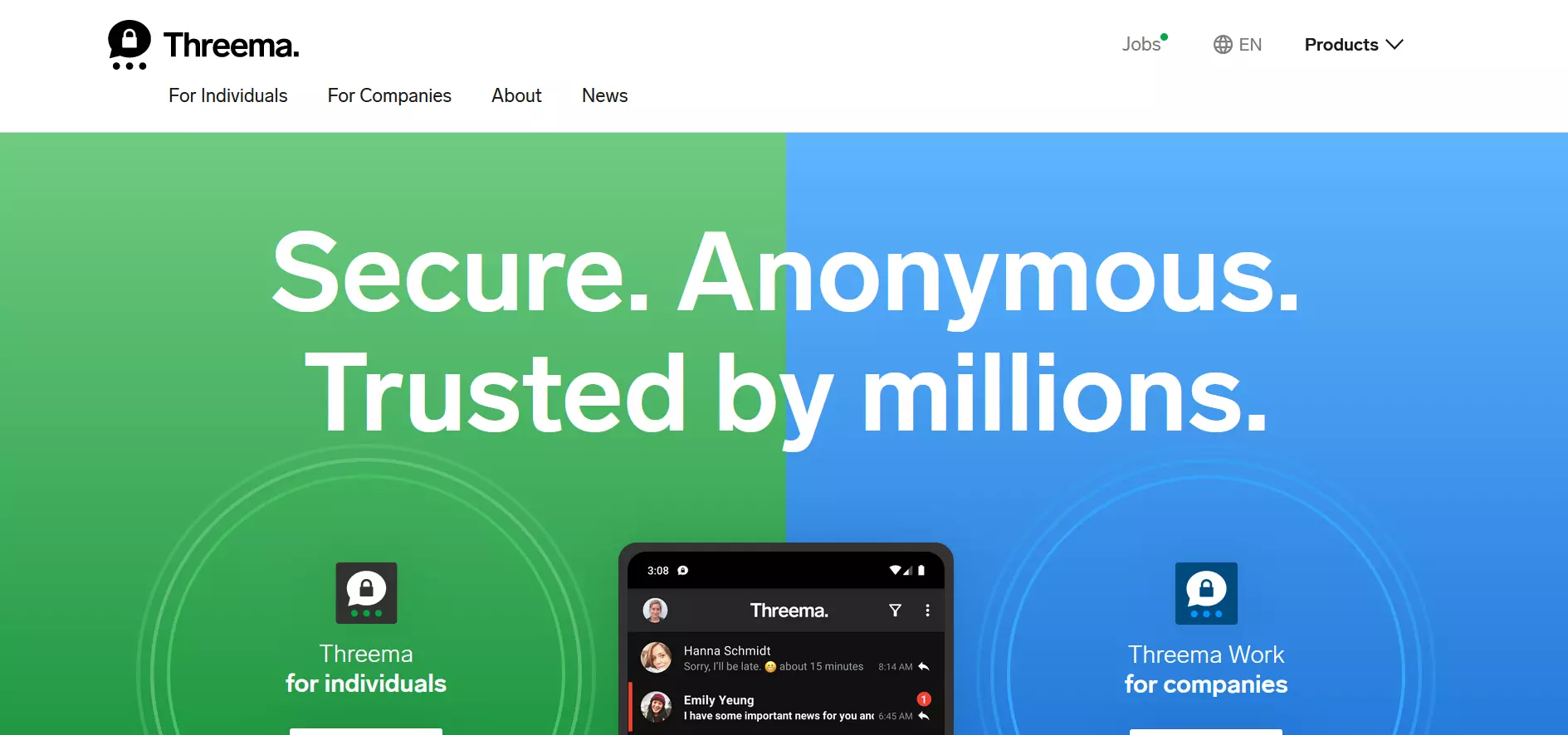
Threema is a messaging app from Switzerland. Like most alternatives to WhatsApp the app is very secure when it comes to data. Like WhatsApp, Threema uses end-to-end encryption for all messages. In addition, messages are deleted from the server as soon as they have been successfully transmitted. Additionally, Threema manages groups and contact lists exclusively on mobile devices, not on the server. When Threema synchronizes contacts from your phone’s contact list, they are transferred to the server anonymously (hashed). In addition, unlike WhatsApp, Threema does not store metadata about who is communicating with whom and when. This WhatsApp alternative takes user data protection much more seriously than its competition does. Threema’s servers are located in Switzerland, where they are subject to strict data protection regulations.
In addition to data protection, Threema also impresses with some useful features. For example, Threema offers a voting feature, which makes it possible for users to easily create surveys. A question to a group of friends, such as where to meet in the evening, no longer leads to many different answers, since the person asking the question can immediately specify a certain number of options that the other participants in the group chat can then vote for. Threema also offers a PIN lock feature for private chats.
The catch with Threema is not only — as with any app that is similar to WhatsApp — the relatively low number of users, but also the fact that the messaging app is not free. In order to use the app, you have to buy one or more licenses for a small fee in the app store or the Threema store. In the Threema store, you can buy the Android version via PayPal, with Bitcoins as well as other payment methods.
| Advantages | Disadvantages |
|---|---|
| Encrypted phone calls are possible | Not free |
| Linking with email or cell phone number is optional | Comparatively few users |
| Open source | Messages can’t self-destruct (but are deleted from the server) |
| No advertising | |
| Company headquarters in Switzerland (where there are strict data protection guidelines) | |
| Hardly stores any metadata | |
| Practical voting feature |
Viber
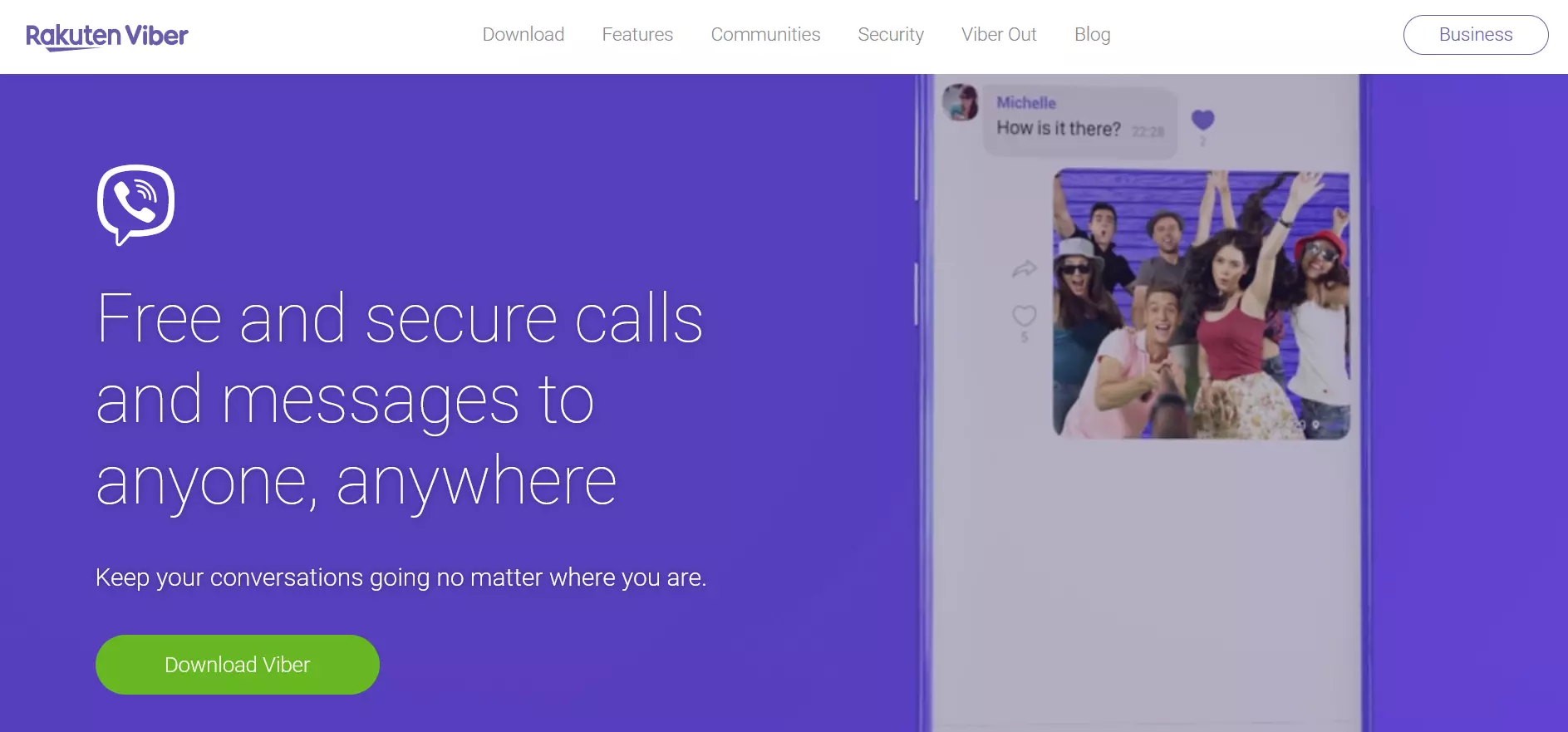
The messenger app Viber was released in 2010 and bought by the Japanese company Rakuten four years later, which is why it is now called Rakuten Viber. In addition to the offering for private individuals, there is also a business variant of the app, which is advertised using success stories from well-known brands such as Coca-Cola and FC Barcelona.
Viber has various features. Besides the usual message exchange including emojis, you can also make voice calls and video chats. If the conversation turns out to have more participants than expected, it’s not a problem. The service enables group chats with no maximum participant limit. Another advantage of this messaging service is the data protection. It is possible to set up messages that self-destruct so that they automatically disappear after being read. End-to-end encryption also ensures that all chats are protected from third party access at all times — including Viber itself.
However, the messaging service also has some downsides. It can be downloaded for free, but unlike other apps, it is not ad-free. With Rakuten Advertising, companies can reach a large number of potential customers by placing their ads on Viber. Another disadvantage of Viber is that free communication can only take place between people who have the app. If you want to call someone who doesn’t have the app installed, it will only work if they have previously purchased the fee-based VoIP service Viber Out. With this service, you can make calls all across the world for $5.99 per month.
| Advantages | Disadvantages |
|---|---|
| End-to-encryption | Advertisements |
| Option to make messages self-destruct | Phone calls are only free with other Viber users |
| Group chat with unlimited participants | |
| Fun features such as emojis and Viber games |
Spike
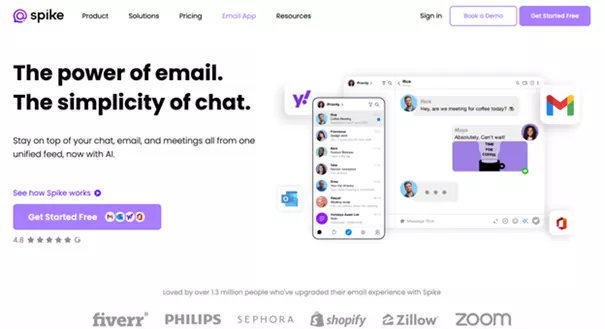
Spike is an innovative messaging, email and collaboration app that not only revolutionizes communication but also serves as a compelling alternative to WhatsApp. Unlike traditional email platforms, Spike transforms your inbox into a streamlined platform for communication, eliminating the complexities of subject lines and signatures. There’s no need to provide a personal phone number when signing up, which sets it apart from other apps like WhatsApp.
Spike’s group chat feature bears a striking resemblance to WhatsApp’s, allowing for instant creation of groups and the ability to add any Spike user. The sole requirement is an email address, granting all group members the ability to engage in real-time messaging. Additionally, Spike enables one-on-one private messaging in both text and voice message formats, along with support for video and audio calls. Data security is a top priority for the Spike team, with all data automatically encrypted using AES-256 before transmission.
Spike’s latest addition, Magic AI, introduces an innovative AI-driven communication assistant that redefines business messaging. By combining human creativity with artificial intelligence, Magic AI boosts productivity, streamlines daily workflows and saves valuable time. It’s important to add that WhatsApp chats are not suitable for work use because it’s a closed ecosystem. Spike embraces open standards and protocols with email. This means that even if your contacts or clients are not using Spike, you can still communicate seamlessly with them.
Spike’s accessibility across various platforms, including a cross-platform web app and apps for iOS, Android, Windows and macOS, ensures that you can effortlessly manage and participate in private and group conversations from any device. All versions of Spike are free for the first user or account. They also offer business plans that include a range of premium features. The Team plan, for example, priced at $6 per member/month, includes a custom email domain (free for the first year), unlimited search history, 100 GB of storage space, and the ability to upload files up to 100 MB in size.
| Advantages | Disadvantages |
|---|---|
| Free of charge for private use | Little transparency about the company itself |
| Can be used without specifying a phone number | Basic version allows a maximum of ten different group chats |
| Cross-platform (web and desktop/mobile apps) | Basic version does not include the option to call more than one person |
| All data is transmitted and stored with unique AES-256 encryption |
Ginlo
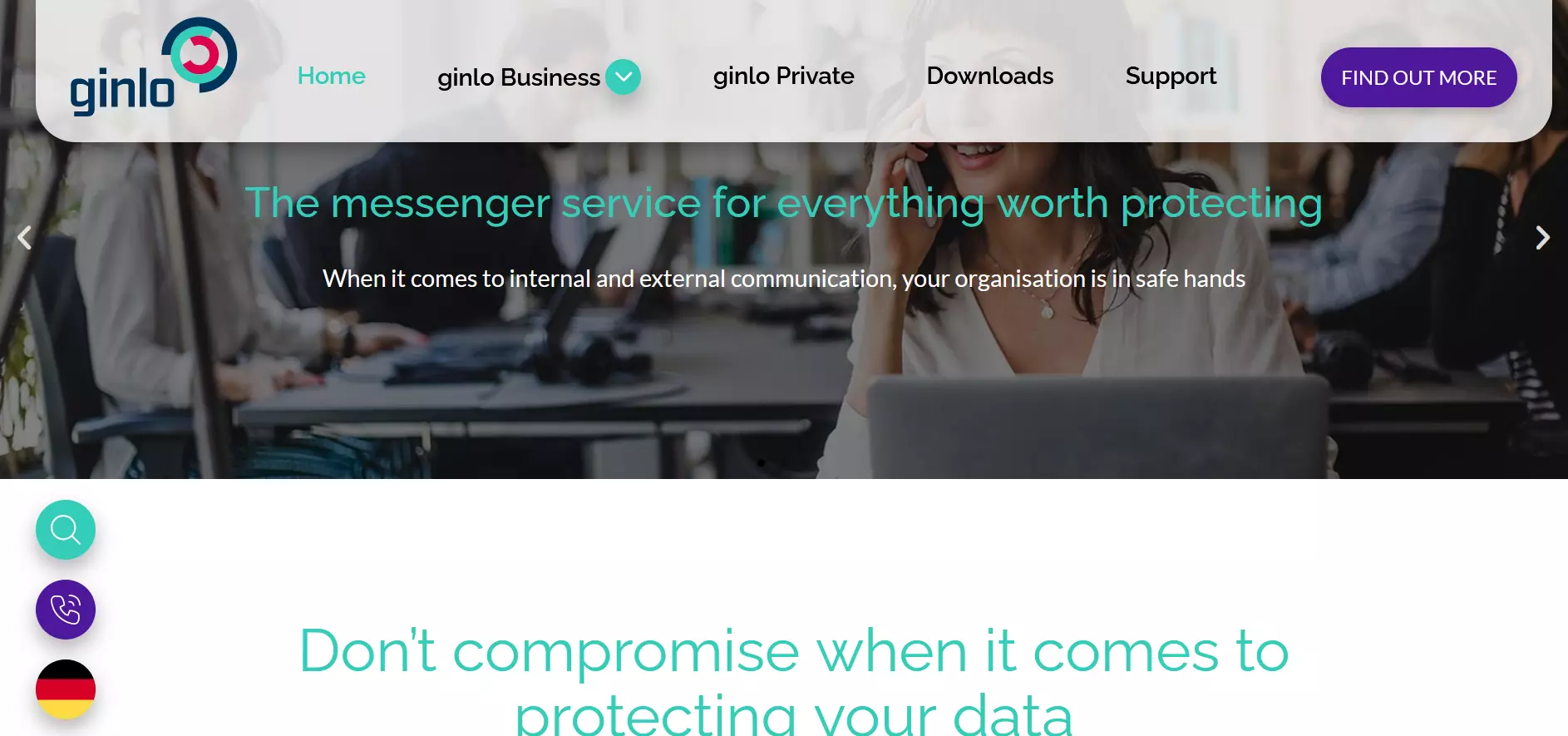
The messenger service Ginlo is operated by the company ginlo.net, which is based in Germany.
Like most apps similar to WhatsApp, Ginlo also enables its users to send encrypted messages and files free of charge and without advertising. Users can further protect their data by scanning a QR code when meeting someone in their contacts in person, therefore verifying their identity.
Self-destructing messages are a special feature. Pictures, videos and chats can be automatically removed as soon as the recipient has seen them. It’s also possible to send messages at a predefined time. To do this, you simply set the time you want to send the message in advance. Another special feature of the app is that users can find out about the latest news via content channels.
The app is available in a free version for private users and a business version. Businesses have the option of having the app’s design customized to their own brand. Unlike private users, business customers can download versions for Mac, Windows and Linux in addition to the Apple and Android versions.
| Advantages | Disadvantages |
|---|---|
| End-to-end encryption | Phone number is required for registration |
| Verification of personal contacts | Low user numbers |
| Self-destructive messages | |
| Messages can be scheduled | |
| Business solution for companies |
Wire
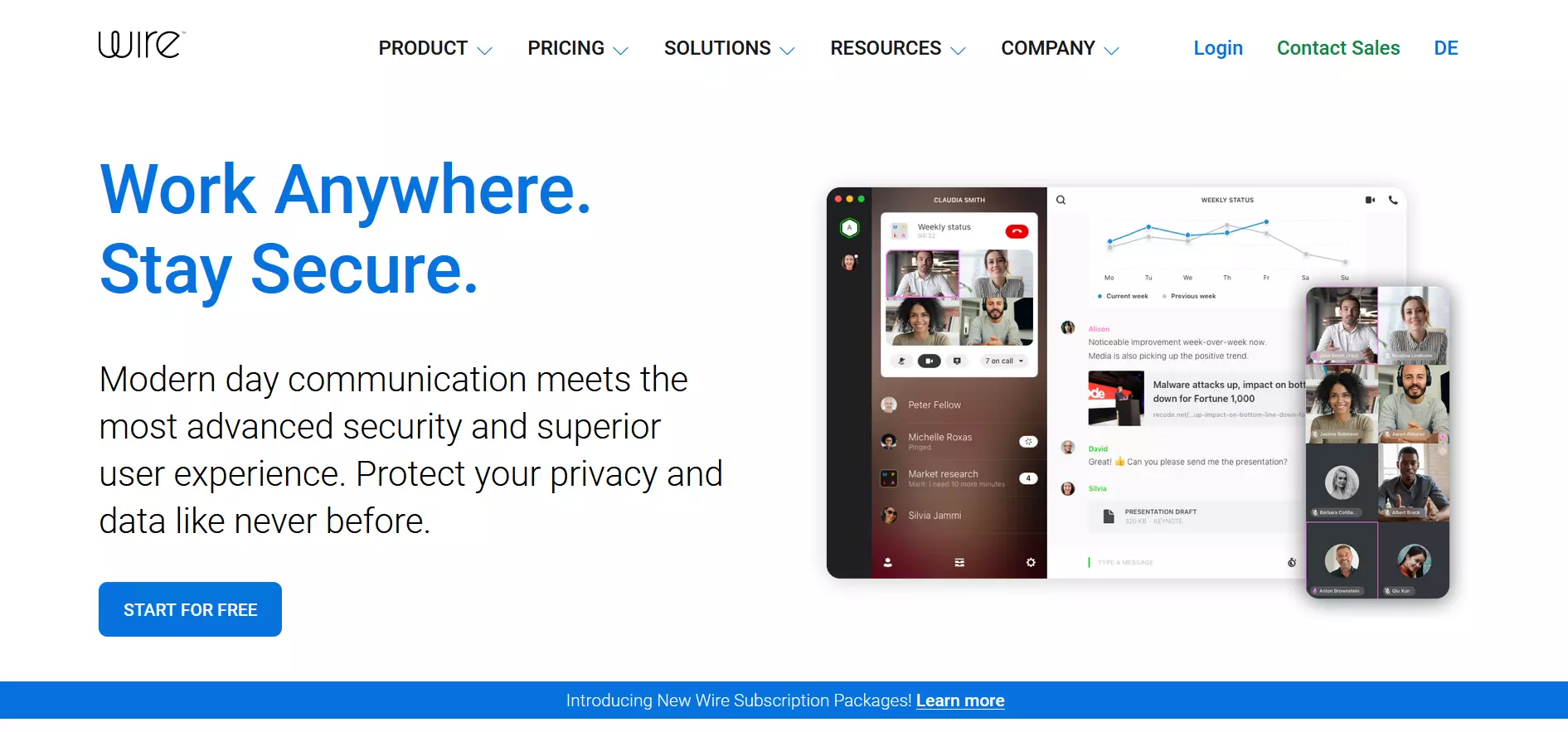
The rather new WhatsApp alternative Wire was founded in 2012 and released two years later. The company has not yet published user figures, but due to many people not being aware of the messaging service, it can be assumed that there are currently still fewer users than with other apps similar to WhatsApp. Like Threema, Wire Swiss GmbH has its headquarters in Switzerland. Most of the technical development of the messaging service, however, takes place in Berlin, Germany. The company also has an office in San Francisco.
Like other messaging services, Wire also offers platform independence and end-to-end encryption. Another plus point is that you can make group calls with the app thanks to voice-over-IP technology. In addition, Wire was founded by Skype co-founder Janus Friis. Just like Skype, phone calls are tap-proof.
However, like Telegram, the app stores metadata, including various user profile and device information. You can read about this in detail in the “Wire Privacy Whitepaper”. In addition, it’s best to be cautious with third-party functions such as YouTube or SoundCloud. This is because the data that users generate when sending such content falls under the data protection provisions of the respective third-party providers. So if you want to avoid disclosing information about your usage behavior, it is better not to use these options.
| Advantages | Disadvantages |
|---|---|
| Subsidiaries in Germany, Switzerland and San Francisco | Low user numbers |
| Cross-platform | Stores metadata |
| Group calls possible | |
| Modern design | |
| Open source |
Summary of WhatsApp alternatives
The biggest disadvantage of WhatsApp alternatives is the comparatively low user rate. This is especially true for some of the options we’ve covered above. This can make using an alternative difficult and unappealing, because even after you’ve downloaded and installed the app, you still need to convince your group of friends to switch to the new messaging service. It’s equally frustrating if you can’t participate in social or business discussions because the entire company is on WhatsApp and using it to have big group chats. Luckily though, you don’t have to choose one or the other. You can install multiple apps without any problems, and the notifications will all appear next to each other on your smartphone’s home screen.
In addition, by using messenger apps that do not store metadata, the data that does get stored about you won’t result in a coherent, reliable usage profile. And perhaps, over time, you will gradually convince your friends and colleagues to use these secure apps as well.
- Store, share, and edit data easily
- Backed up and highly secure
- Sync with all devices

